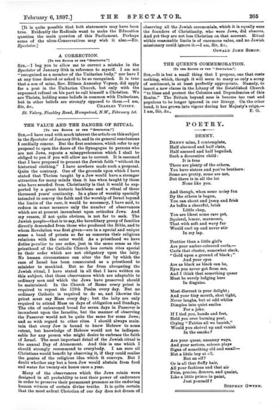THE VALUE AND THE DANGER OF RITUAL.
[To Tux Boma or rim "Briccriros."]
SIR,—I have read with much interest the article on this subject in the Spectator of January 30th, and in its general conclusions I cordially concur. But the first sentences, which refer to my proposal to open the doors of the Synagogue to persons who are not Jews, repeats a misapprehension which I shall be obliged to you if you will allow me to correct. It is assumed that I have proposed to present the Jewish faith " without its historical clothing." I have nowhere made such a proposal. Quite the contrary. One of the grounds upon which I have stated that Theism taught by a Jew would have a stronger attraction for many minds than it has when taught by those who have seceded from Christianity is that it would be sup- ported by a great historic backbone and a ritual of three thousand years' continuity. In a place of worship specially intended to convey the faith and the worship of Israel beyond the limits of the race, it would be necessary, I have said, to reduce in some measure only the number of observances which are at present incumbent upon orthodox Jews. And my reason, if not quite obvious, is not far to seek. The Jewish people—that is to say, the hereditary group of families directly descended from those who produced the Bible, and to whom Revelation was first given—are in a special and unique sense a band of priests so far as concerns their religions relations with the outer world. As a priesthood we have duties peculiar to our order, just in the same sense as the priesthood of the Catholic Church has certain rites special to their order which are not obligatory upon the laity. No human circumstance can alter the fiat by which the race of Israel has been consecrated as a priesthood to minister to mankind. But so far from abrogating the Jewish ritual, I have stated in all that I have written on this subject, that those observances which are adaptable to ordinary men and which the Jews have preserved should be maintained. In the Church of Rome every priest is required to repeat the 119th Psalm every day. But no ordinary Catholic is required to do so, and likewise the priest must say Mass every day ; but the laity are only required to attend Mass on days of obligation and Sundays. The rite of unleavened bread for seven days in Passover is incumbent upon the Israelite, but the manner of observing the Passover would not be quite the same for some Jews; and so with regard to other rites. I should always main- tain that every Jew is bound to know Hebrew to some extent, but knowledge of Hebrew would not be indispen- sable for any person who might desire to embrace the faith of Israel. The most important detail of the Jewish ritual is the annual Day of Atonement. And this is one which I should strongly recommend to everybody. I am sure all Christians would benefit by observing it, if they could realise the genius of the religions idea which it conveys. But I doubt whether any but a born Jew would abstain from food and water for twenty-six hours once a year.
Many of the observances which the Jews retain were designed in all probability to test their power of endurance in order to preserve their permanent presence as the enduring human witness of certain divine truths. It is quite certain that the most ardent Christian of our day does not dream of
observing all the Jewish ceremonials, which it is equally sure the founders of Christianity, who were Jews, did observe. And yet they are not less Christian on that account. Ritual within reasonable limits is of enormous value, and no Jewish missionary could ignore it.—I am, Sir, &o.,
OSWALD JOHN SIMON.






































 Previous page
Previous page